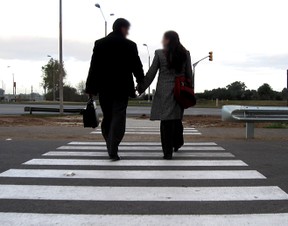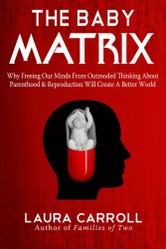 Childless is defined simply as a being "without children". A childless state can be due to numerous factors: infertility, lack of resources to become parents, inability to meet adoption requirements, voluntary celibacy, infant death, lack of suitable partner, a partner's unwillingness to be a parent, and of course, making the conscious decision to not have children.
Childless is defined simply as a being "without children". A childless state can be due to numerous factors: infertility, lack of resources to become parents, inability to meet adoption requirements, voluntary celibacy, infant death, lack of suitable partner, a partner's unwillingness to be a parent, and of course, making the conscious decision to not have children.
Childfree is a term which dates only from the late 20th Century, and is typically defined as "voluntary childlessness" and "people who have made a personal decision not to have children." (Wikipedia) It is therefore not a historical word, but one coined to specify the conscious choice not to procreate or be a parent.
The advent of modern, reliable birth control methods has made this choice available to many where it would not have been in the past. Women in developed countries are also more likely to be able to pursue an education and career that gives them a choice in life beyond marriage, motherhood, and then caring for their elders.
Many of those who have chosen not to have children strongly dislike the word childless, feeling that it implies they are somehow "lesser" or missing something in their lives when that is not the case. Those who choose to not have children often feel that makes their lives better or more fulfilling, not the other way around, so they are happy to celebrate living childfree.
However, for a person who would like to have a child and has been unable to, for whatever reason, the term childfree may feel like an uncomfortable fit. It's not something they want to celebrate; it's not a "positive" to them, the way other "-free" terms might be (fat-free, sugar-free, interest-free, royalty-free, etc.) If they use the term childfree, they may feel they need to add "not by choice" or "by circumstance" when in a discussion where the term childfree is being used.
It can be a prickly point and everyone seems to have different comfort levels with being called either childfree or childless. In fact, some of those who have chosen to be childfree say you cannot use that term for yourself if you've ever wanted children at any point in your life.
The Childfree Community on Livejournal makes their stance on the terminology matter quite clear, from the childfree by choice point-of-view:
"We choose to call ourselves 'childfree' rather than 'childless,' because we feel the term 'childless' implies that we're missing something we want -- and we aren't... Childfree means that you do not want children -- now or ever. If you have no kids now, but plan to in the future -- through adoption or biologically -- you are childless."
Image credit


 Childless is defined simply as a being "without children". A childless state can be due to numerous factors: infertility, lack of resources to become parents, inability to meet adoption requirements, voluntary celibacy, infant death, lack of suitable partner, a partner's unwillingness to be a parent, and of course, making the conscious decision to not have children.
Childless is defined simply as a being "without children". A childless state can be due to numerous factors: infertility, lack of resources to become parents, inability to meet adoption requirements, voluntary celibacy, infant death, lack of suitable partner, a partner's unwillingness to be a parent, and of course, making the conscious decision to not have children.







 A Potentially Fatal Accident in the Homeon 11/24/2018
A Potentially Fatal Accident in the Homeon 11/24/2018
 Windsurfing Lessons on Montserrat: One of My Funniest—and Fondest—Travel Memorieson 11/20/2018
Windsurfing Lessons on Montserrat: One of My Funniest—and Fondest—Travel Memorieson 11/20/2018
 Christmas Ornaments Celebrating Rome, Italyon 11/12/2018
Christmas Ornaments Celebrating Rome, Italyon 11/12/2018
 Philadelphia-Themed Christmas Ornamentson 11/09/2018
Philadelphia-Themed Christmas Ornamentson 11/09/2018



Comments